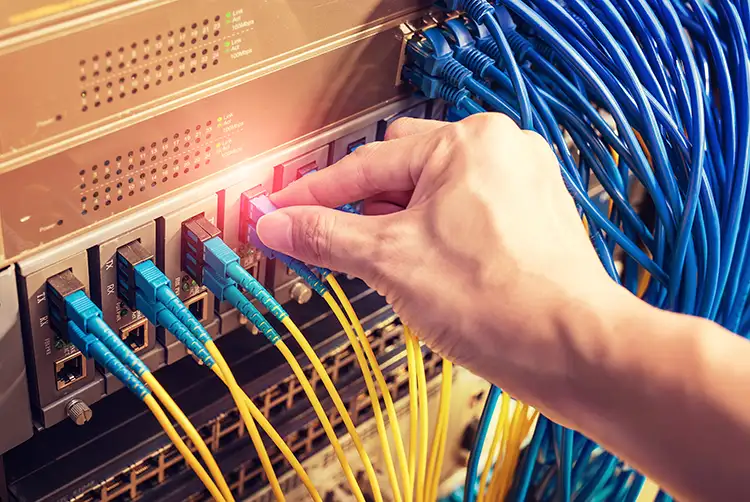Comprehensive Guide to Fiber Optics for Commercial and Industrial Buildings
Fiber optic technology is essential in modern commercial and industrial buildings, offering unparalleled speed and reliability for data transmission. This guide explores the various types of fiber optics, connectors, and their applications to help you make informed decisions for your infrastructure. Whether you’re upgrading an existing network or installing a new one, understanding fiber optics is crucial to future-proofing your systems.
Contact us today if you’d like to learn more about our low voltage cabling services.

Multimode Fiber
Multimode Fiber is designed for short-distance data transmission within buildings. It has a larger core diameter, allowing multiple modes of light to propagate. This type is ideal for local-area networks (LANs) and is commonly used in data centers and commercial buildings.
Single Mode Fiber
Single Mode Fiber features a small core diameter, enabling it to carry light directly down the fiber. This minimizes attenuation and allows for long-distance data transmission, making it perfect for telecommunication networks and large industrial complexes.
Graded-Index Fiber
Graded-Index Fiber uses variations in the glass composition in the core to reduce modal dispersion. It offers higher bandwidth and is used in multimode fibers to enhance performance over moderate distances, suitable for commercial and industrial environments.
Fiber Optic Connectors
LC Connector
LC Connector is a small form-factor connector widely used in high-density applications. Its push-pull mechanism simplifies installation and removal, making it ideal for crowded data centers and commercial networking setups.
SC Connector
SC Connector features a push-pull locking system, ensuring a secure connection. It is commonly used in network applications due to its reliability and ease of use in commercial buildings.
FC Connector
FC Connector has a threaded coupling mechanism, providing strong mechanical stability. It is typically used in high-vibration environments such as industrial settings.
ST Connector
ST Connector is characterized by its bayonet-style coupling, making it easy to install and remove. It is often used in multimode networks within commercial buildings.
MPO/MTP Connectors
MPO/MTP Connectors are designed for high-density applications, supporting multiple fibers in a single connector. They are used in data centers for rapid deployment of high-speed networks.
MT-RJ Connector
MT-RJ Connector is a compact connector that allows for the connection of two fibers. It is often used in duplex multimode applications in commercial settings.
Fiber Specifications
Size
Fiber Size is measured by the core and cladding diameters. Common sizes include 50/125 and 62.5/125 microns for multimode fiber and 8-9/125 microns for single mode fiber. These sizes are crucial for compatibility and performance in commercial and industrial applications.
Attenuation
Attenuation refers to the signal loss as it travels through the fiber. Lower attenuation values indicate better performance. For
instance, single mode fibers typically have attenuation of 0.4/0.25 dB/km at 1310/1550 nm, making them ideal for long-distance transmissions in large buildings.
Bandwidth
Bandwidth is the data carrying capacity of the fiber. Multimode fibers like OM3 and OM4 offer high bandwidth suitable for high-speed data transfer within commercial buildings.
Applications of Fiber Optics in Commercial and Industrial Buildings
Data Centers: High-density, high-speed data transmission.
Telecommunications: Reliable long-distance communication.
Networking: Robust LANs for business operations.
Industrial Automation: High-speed, reliable data transfer in manufacturing environments.
Fiber optic technology is indispensable in commercial and industrial buildings, providing the high-speed, reliable data transmission needed for modern operations. By understanding the different types of fibers, connectors, and their specifications, you can choose the best solutions for your specific needs, ensuring optimal performance and future-proofing your infrastructure.
Contact Us
Please use the form below to send us a message. We can also be reached by phone at 800-364-EDGE. We look forward to hearing from you.
N29 W23810 Woodgate Ct W – Suite 100
Pewaukee, WI 53072
800-364-EDGE
Our service area includes: Milwaukee, Madison, Green Bay, Kenosha, Racine, Appleton, Waukesha, Oshkosh, Janesville, West Allis, Sheboygan, Wauwatosa, Brookfield, New Berlin, Menomonee Falls, Greenfield, Franklin, Oak Creek, West Bend, Mount Pleasant, Germantown, Oconomowoc, Cudahy, Ashwaubenon, Pewaukee, Fond du lac, Beaver Dam, Elkhorn, Lake Geneva and more.
